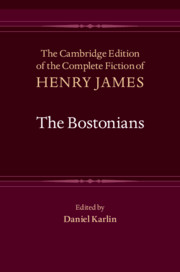Book contents
- Frontmatter
- Contents
- Acknowledgements
- List of Abbreviations
- General Editors’ Preface
- General Chronology of James’s Life and Writings
- Introduction
- Textual Introduction
- Chronology of Composition and Production
- Bibliography
- The Bostonians
- Glossary of Foreign Words and Phrases
- Notes
- Textual Variants
- Emendations
- Appendices
III
Published online by Cambridge University Press: 11 April 2021
- Frontmatter
- Contents
- Acknowledgements
- List of Abbreviations
- General Editors’ Preface
- General Chronology of James’s Life and Writings
- Introduction
- Textual Introduction
- Chronology of Composition and Production
- Bibliography
- The Bostonians
- Glossary of Foreign Words and Phrases
- Notes
- Textual Variants
- Emendations
- Appendices
Summary
WHEN he had told her that if she would take him as he was he should be very happy to dine with her, she excused herself a moment and went to give an order in the dining-room. The young man, left alone, looked about the parlour — the two parlours which, in their prolonged, adjacent narrowness, formed evidently one apartment — and wandered to the windows at the back, where there was a view of the water; Miss Chancellor having the good fortune to dwell on that side of Charles Street toward which, in the rear, the afternoon sun slants redly, from an horizon indented at empty intervals with wooden spires, the masts of lonely boats, the chimneys of dirty ‘‘works,’’ over a brackish expanse of anomalous character, which is too big for a river and too small for a bay. The view seemed to him very picturesque, though in the gathered dusk little was left of it save a cold yellow streak in the west, a gleam of brown water, and the reflection of the lights that had begun to show themselves in a row of houses, impressive to Ransom in their extreme modernness, which overlooked the same lagoon from a long embankment on the left, constructed of stones roughly piled. He thought this prospect, from a city-house, almost romantic; and he turned from it back to the interior (illuminated now by a lamp which the parlour-maid had placed on a table while he stood at the window) as to something still more genial and interesting. The artistic sense in Basil Ransom had not been highly cultivated; neither (though he had passed his early years as the son of a rich man) was his conception of material comfort very definite; it consisted mainly of the vision of plenty of cigars and brandy and water and newspapers, and a cane-bottomed arm-chair of the right inclination, from which he could stretch his legs. Nevertheless it seemed to him he had never seen an interior that was so much an interior as this queer corridor-shaped drawing-room of his new-found kinswoman; he had never felt himself in the presence of so much organised privacy or of so many objects that spoke of habits and tastes. Most of the people he had hitherto known had no tastes; they had a few habits, but these were not of a sort that required much upholstery.
- Type
- Chapter
- Information
- The Bostonians , pp. 16 - 24Publisher: Cambridge University PressPrint publication year: 2019

